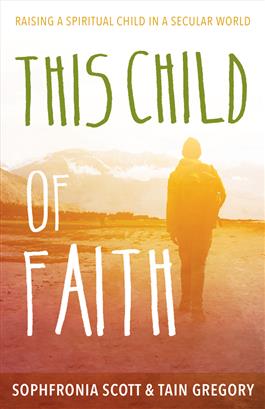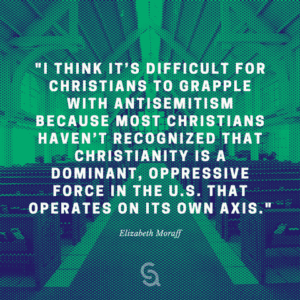
Sophfronia Scott and her son, Tain Gregory, have a compelling story to tell. In December 2012, Tain was a third-grader at Sandy Hook Elementary, the school that became synonymous with the tragedy of school shootings when 20 first-grade children and six adult staff members were killed at Sandy Hook in a massacre that took only moments. Tain’s friend, Ben, was among those killed, as was the school’s principal, a woman who had only months earlier warmly welcomed Tain to his new school. Sophfronia and Tain tell their story in the book This Child of Faith: Raising a Spiritual Child in a Secular World.
This was not the only loss Tain had experienced in his young life. In that same year, his aunt—Sophfronia’s sister—died from complications following surgery. His best friend’s father was killed in a traffic accident. His beloved grandmother passed away. In the midst of overwhelming grief, Tain and his mother turned to their nascent Christian faith and their religious community for comfort and support, acknowledging that while God did not cause these events, God’s presence—expressed through the love of friends, family, and the church—would carry them through.
Much of This Child of Faith narrates the family’s discovery of belief, a discovery that served as a foundation upon which they could stand when tragedies beset their family and community. Rather than an instructional or how-to book, This Child of Faith traces Sophfronia’s and Tain’s spiritual journey as an exemplar for others, a reminder that “the spiritual journey is neither straight nor perfect. But we are on it.” Sophfronia hopes that, in telling her family’s story, readers may have the “strength, faith, love, and hope to take up the path” with their own children.
In the midst of overwhelming grief, Tain and his mother turned to their nascent Christian faith and their religious community for comfort and support, acknowledging that while God did not cause these events, God’s presence—expressed through the love of friends, family, and the church—would carry them through.
In the opening chapters of This Child of Faith, Sophfronia describes her upbringing: learning about God from her father’s eight-track tapes of sermons from Billy Graham and The Reverend C.L. Franklin, learning about the Bible from The Greatest Story Ever Told, and learning about Jesus from Jesus of Nazareth. As an undergraduate at Harvard, Sophfronia met people from across the belief spectrum, including an atheist who became a close friend, and another friend, an evangelical, who told Sophfronia her atheist friend would be condemned to hell. For Sophfronia, early encounters with faith were a muddle, a paradox that moved toward resolution when her son, Tain, was born.
Tain likewise began his spiritual journey through music and film, and his early encounters with VeggieTales prompted him to ask questions about the Bible, God, and Sunday school, questions that Sophfronia felt might best be answered by visiting—and eventually joining—a church. Together, Sophfronia and her family searched for a spiritual home, and after one false start, found themselves at Trinity Episcopal, a place that felt right almost immediately, in part because of the warm inclusion they felt, in part because the church promised—via promotional material—to foster “the gift of joy and wonder.” For Sophfronia, these were things she especially wanted for Tain, and she felt that Trinity Episcopal Church would make good on that promise.
Sophfronia clearly loves her new-found church community, and a definite strength in This Child of Faith is her descriptions of navigating her first communion alongside Tain as well as their growing familiarity with the rituals of church. The family’s immersion into the life of church shows a deep sense of fidelity and care for the people who worship there, and Trinity’s pastor, Kathie, seems like the kind of Christian leader every church needs: empathetic, thoughtful, willing to help newcomers feel at home by intentionally shepherding them.
Tain’s journey, written from his point of view, accompanies Sophfronia’s own narrative. These sections are called “Tain’s Takes,” and appear in each chapter, providing a nice counterpoint to Sophfronia’s perception of events. The short vignettes show Tain’s spiritual growth in time, both in terms of what he says and how he says it; in later chapters, as he narrates his grief at losing his friend Ben, it’s clear that Pastor Kathie’s influence on Tain has been immense. Indeed, as I read This Child of Faith, I thought that every child needs a person like Pastor Kathie, and a faith community like Trinity, to help them navigate the inevitable difficulties we all face in a broken world.
Parts of Sophfronia’s and Tain’s story will be recognizable to parents who are attempting to raise their children into people of faith: the inquisitiveness of a child, asking all manner of existential questions, and the oft-times inadequacy we feel in providing answers that make sense. The longing to be part of an enriching church community, and the challenges of being invested when other people might not be. The ways parenting preteens and teens introduces new challenges to helping children relate to God and the church.
While Sophfronia sometimes seems to imply Tain’s journey is unique in these ways, my experience raising two boys to become children of faith suggests that Tain’s trajectory is similar to that of many young people. The strongest parts of This Child of Faith come later in the book, when Tain’s life journey is so unlike most other children: that is, when he faces hardships that most children are lucky to avoid, and when his amazing faith community surrounds his family, offering love and support in ways that are unique and powerful.
Readers looking for specific instructions on how to raise children of faith will not find answers here, as Tain and Sophfronia simply narrate their story. But in that simple narration resides an important truth: the unique paths our spiritual journeys take often intersect with others, and it is in those intersections—within our churches, our home communities, our friends and families—where we most powerfully see God. Helping our children find these intersections might be the best thing we can do for them if we hope to raise them to be adults of faith, too.
Melanie Springer Mock is a Professor of English at George Fox University, Newberg, Oregon. She is also the author or co-author of four books including, most recently, If Eve Only Knew: Freeing Yourself from Biblical Womanhood and Becoming All God Means for You to Be (Chalice Press, 2015); a fifth book is forthcoming from Herald Press. Her essays and reviews have appeared in The Nation, Christianity Today, The Chronicle of Higher Education, and Mennonite World Review, among other places.


